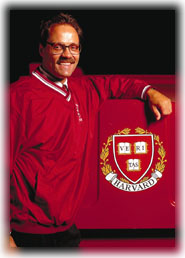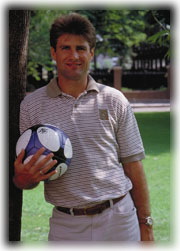![]()
Main Menu ·
Search ·
Current Issue · Contact · Archives · Centennial · Letters to the Editor · FAQs
![]()
Main Menu ·
Search ·
Current Issue · Contact · Archives · Centennial · Letters to the Editor · FAQs

The spring-to-summer period saw one of the busiest hiring seasons in memory for Harvard's athletic department, as four new head coaches joined the staff. In addition to Peter Brand, who will polish the thrusts of Crimson fencers, new coaches will guide men's hockey and soccer, and both the squash teams. Profiles of these three newly arrived mentors follow.
Men's Hockey: Mark Mazzoleni
 Mark Mazzoleni Photograph by Stu Rosner
Mark Mazzoleni Photograph by Stu Rosner |
After 11 seasons as a head coach, most recently at Miami University (Ohio), Mazzoleni has a track record to back up his high aspirations. In 1985-86, he took his first top job at the University of Wisconsin-Stevens Point, an NCAA Division III college that had recorded a dismal 14-83-4 record in the previous four years. Mazzoleni coached the Pointers for six seasons, and in his final three campaigns won a trio of consecutive NCAA championships, a feat never before accomplished in Division III.
Next, Mazzoleni joined a major ice-hockey power, the University of Minnesota, as assistant coach and recruiting coordinator. He calls his mentor there, former Minnesota head coach Doug Woog, "the most important influence on me." Mazzoleni teaches clean, fast-skating, sharp-passing hockey. "We don't like to play a dump-and-chase game," he says. "We like to pressure them when we have the puck and when we don't have the puck." This rink philosophy--perfectly aligned with Cleary's thinking as well as with Harvard's historical playing style--took root during Mazzoleni's Minnesota years. (He admits that his Stevens Point teams were "big, strong guys who played a physical game.")
In 1994 Mazzoleni moved to Miami University of the Central Collegiate Hockey Association (CCHA), arguably the strongest conference in the nation, boasting such powerhouses as Michigan, Michigan State, and Lake Superior State, as well as seven of the last 14 NCAA Division I champions. Over five seasons at Miami, Mazzoleni's icemen recorded an 85-83-20 mark for a .505 winning percentage. A high-water mark was the 1996-97 campaign, when the Red Hawks went 27-12-1, placing second in the CCHA and making their second-ever NCAA appearance.
A native of Green Bay, Wisconsin, Mazzoleni was a goaltender for Michigan State, graduating in 1980. He stresses discipline on the ice as a key to success, noting, "Any team I've coached has been at the bottom of the league in penalties taken." The Crimson hopes such principles will help them rebound from last season's disappointing 14-16-2 mark. "You can play a hard-checking game and stay out of the penalty box," says hockey captain Trevor Allman '00. "For us, it's very exciting to have a fresh start."
Men's Soccer: John Kerr
 John Kerr Photograph by Stu Rosner
John Kerr Photograph by Stu Rosner |
"I know that first and foremost I want players to enjoy themselves and to be proud to be members of the Harvard soccer team," Kerr says. "Competitively, our first goal should be to win the Ivy League, which also means an automatic bid into the NCAA playoffs. The ultimate vision is to win the national championship for Harvard. There are lots of ingredients involved in building to something like that."
Kerr should know: as a junior at Duke, he led his side to the 1986 national title. That year, Kerr swept every collegiate award into his rucksack. In addition to the Hermann Award, he won the Missouri Athletic Club Collegiate Player of the Year Award while also being tabbed Player of the Year by Soccer America, Adidas, and the Atlantic Coast Conference. After graduating from Duke in 1987, he played professionally in England, Ireland, France, Canada, and the United States. From 1992 to 1995, he played for the Millwall Football Club, becoming the first American to play in the English First Division league, and also the first Yank to score a hat trick there. In 1996 he joined the Dallas Burn of Major League Soccer, who traded him to the New England Revolution, where he played for two seasons prior to becoming the Bulldogs' player-coach in 1998.
Born in Toronto of Scottish parents, Kerr grew up in a soccer family; his father was a professional player. He began coaching in 1988 as a youth coach in London's Football Association. In 1992 he spent a season as an assistant coach at Duke. "I know it sounds corny, but I like players with a positive, never-say-die attitude," he says. "And those who give 100 percent at all times--especially on the practice field."
Squash: Satinder Bajwa
In 1994-1995, intercollegiate squash changed from hardball to the softball or "international" game, and appropriately enough, Satinder Bajwa, Harvard's new coach of men's and women's squash, has a truly international background. Born in India, Bajwa is an American citizen who was educated in the United Kingdom. He comes to Cambridge from Bowdoin College, where last year his men's and women's teams went 12-4 and 12-5, respectively.
Bajwa, known as "Baj," inherits one of the most successful programs in the history of college athletics. Harvard's women have won or shared 10 of the 15 national titles in the history of women's college squash, and the Crimson men have won eight of the last nine national titles and 31 of 55 all-time. Much of this success came under the leadership of former head coach Bill Doyle, who resigned to move to New Orleans. Doyle compiled a 179-7 overall record (.962 winning percentage) and a 78-1 Ivy League mark over seven seasons from 1992 to 1999.
Lopsided winning records are nothing new to Bajwa, however, who, since 1991, has been managing coach to Jansher Khan, the world's top-ranked squash player. "If there is one thing I am used to, it is dominance," he says, "and I think I have learned a thing or two on how to remain dominant." Bajwa adds, "I've become a believer in keeping things simple. Jansher really epitomized this. I have also found that in general, the better the player is, the more basic his or her game is."
During his years on the pro squash tour from 1982 to 1985, Bajwa reached a professional ranking as high as 32. He began his coaching career at West Point, where he mentored the cadets from 1985 to 1988. He then returned to England as player-coach of a professional squash team based in London, and later held various junior coaching positions, including work with the Israeli and Indian junior teams. He was head professional at squash clubs in England and the United States before returning to college coaching at Bowdoin.
Last year, despite a 12-2 record overall and an Ivy championship, the Crimson saw Trinity College, an emerging squash power, win its first national title at Harvard's expense. Harvard's two defeats were both 8-1 drubbings at the hands of Trinity. Bajwa knows the Trinity squad well, having personally coached several of them either individually or in clinics. "Harvard can certainly recapture the top spot through being a team first and individuals second," he says. "I truly believe that we have the quality to beat any team in the land by having a positive attitude towards training to win!"
Main Menu ·
Search · Current Issue · Contact · Archives · Centennial · Letters to the Editor · FAQs
![]()